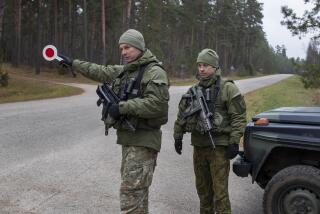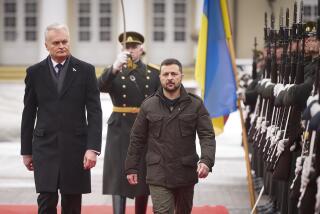Lithuanians Defy Soviets on Deadline : Secession: Republic says it will ignore an ultimatum to renounce independence by today or face economic sanctions. ‘We are not afraid of that blockade,’ one leader said.
- Share via
MOSCOW — Lithuania’s leaders drafted a curt and defiant response Saturday to President Mikhail S. Gorbachev’s threat of an economic boycott, refusing to recognize a Kremlin-set deadline for renouncing independence and demanding a full explanation of what punitive steps Moscow intends to take.
“The Soviet Union has until recently waged a psychological and political war against Lithuania, and now it is unleashing an economic war as well,” an unrepentant Lithuanian President Vytautas Landsbergis, the first non-Communist leader of any Soviet republic, said at a news conference. “They still demand impossible things of us, and this is a way to avoid beginning negotiations.”
But despite the tough stance emanating from the Lithuanian capital of Vilnius, Western advisers have said the republic must maintain economic ties with the Soviet Union if it is to survive as an independent state. Thus, in the war of nerves, Gorbachev was successful: His threat of an economic boycott raised tensions in the republic, Lithuanian leaders acknowledged privately.
Meanwhile, Pope John Paul II sent an encouraging message to Lithuania, and Britain’s foreign secretary, Douglas Hurd, called on the Kremlin to open a dialogue with the rebellious republic instead of trying to force it back into the fold.
A further sign of support came from the neighboring Baltic republic of Latvia, where breakaway Communists met in the capital of Riga and vowed--even in the face of Moscow’s threats against Lithuania--to create an independent Latvia.
Gorbachev, in a letter delivered to Vilnius on Friday night, gave Lithuania until today to withdraw its March 11 declaration of independence. Otherwise, he said, the Soviets would stop shipping items they could export to other countries for hard currency. Such products include oil and natural gas, for which Lithuania’s 3.7 million residents rely completely on Moscow.
Gorbachev has repeatedly refused to negotiate with the republic until it reverses its independence declaration. For their part, Lithuanian leaders have expressed eagerness to discuss everything with the Soviet Union except the declaration itself, which they say cannot be overturned.
The draft message from Lithuania in response to Moscow read: “Unfortunately, Mr. Gorbachev, your telegram came in the midst of the Easter holiday, and we cannot answer you. Before we do so, please explain specifically what supplies you intend to cut from our republic.”
Lithuanian leaders, who met for about three hours at the Council of Ministers in Vilnius, decided to delay sending the telegram until it is approved by the entire Parliament, which currently is recessed for the Easter holiday.
The text of the draft message was given to reporters by government adviser Algimantas Cekoilis, who attended the session as an observer. “Let there be no rush,” Cekoilis said afterward. “It’s Easter. And we are not afraid of that blockade.”
The Lithuanian leaders also discussed the possibility of responding to a Moscow economic boycott by halting export of goods they now send to the Soviet Union--primarily electronic components.
“Lithuania can also create certain difficulties for the economy of the Soviet Union by not supplying it with this or that product,” Landsbergis told reporters.
In addition, Parliament spokesman Aidas Palubinskas said that Lithuanian leaders believe some republics would ignore a Moscow-ordered economic blockade of the Lithuanians. “Especially republics like Azerbaijan and Georgia, which want independence,” he said. “They understand they are going to be in the same boat.”
Palubinskas also noted that the republic produces more meat and milk than it consumes so “Lithuania cannot starve.”
A Soviet newspaper, Rural Life, reported Saturday that not only would Lithuania soon be required to pay hard currency for items it purchases from the Soviet Union such as oil, gasoline and diesel fuel, but the Soviet Union also would start paying less for the items it gets from Lithuania.
“The prices are higher on the Soviet market than on the world market for Lithuania’s exports of meat, milk, fish, knitwear and other light-industry products,” the newspaper contended. “According to economists’ estimates, Lithuania’s unfavorable balance would exceed 3.5 billion rubles ($5.6 billion).”
The newspaper said that negotiations are necessary between Moscow and Vilnius, whose people “have lived in one family side by side for half a century. . . . The question is whether the Lithuanian Parliament in this difficult situation can make a step that will enhance its prestige, namely admit that the proclamation of Lithuania’s independence forestalled the natural course of present political processes.”
Also Saturday, a Lithuanian economist and legislator said that a cutoff of exportable items would severely damage the republic’s economy and put many factory employees out of work. “Workers aren’t ready to suffer in such a degree,” Kazimieras Antanavicius told reporters.
Antanavicius, who has argued since Lithuania declared its independence that it was moving too quickly, suggested that Lithuania temporarily suspend its sovereignty declaration in an effort to persuade Gorbachev to begin negotiating. His suggestion, however, is not likely to carry much weight in Vilnius, leaders there said.
In Latvia, more than 500 rebellious Communists gathered in the University of Latvia in Riga, and a banner displayed outside read: “Throw Out the Occupiers. Freedom to Latvia.”
“The political goals of our organization are a democratic society and an independent Latvia,” said Marite Rukmane, one of those Communists gathered for Saturday’s session.
Latvian’s independence leaders are likely to face tougher opposition than their counterparts in Lithuania and Estonia because Latvians make up just over 50% of the republic’s population, while Lithuanians and Estonians hold comfortable majorities in their regions.
In Rome, the Pope met Saturday with Vadim Zagladin, a top Gorbachev aide, and sent an Easter telegram of encouragement to the predominantly Roman Catholic republic of Lithuania.
“In these hours of trepidation and of hope, I am particularly close to the Lithuanian church, which across centuries and generations has conserved its faith intact,” said the telegram sent to Lithuanian Cardinal Vicentas Sladkevicius. “My affectionate solicitude embraces likewise all your noble people to whose aspirations I have never been closer.”
Vatican officials declined to say what was discussed in the meeting between the pontiff and Zagladin.
In London, Hurd warned that if Moscow uses coercion instead of dialogue to keep Lithuania in its fold, “there will be a penalty to pay in terms of Russia’s dealings with the West.” Free-lance journalist Esther Schrader, in Vilnius, contributed to this story.
Moscow CONDEMNED: U.S. senators decry Soviet repression in the Baltics. A8
More to Read
Sign up for Essential California
The most important California stories and recommendations in your inbox every morning.
You may occasionally receive promotional content from the Los Angeles Times.













